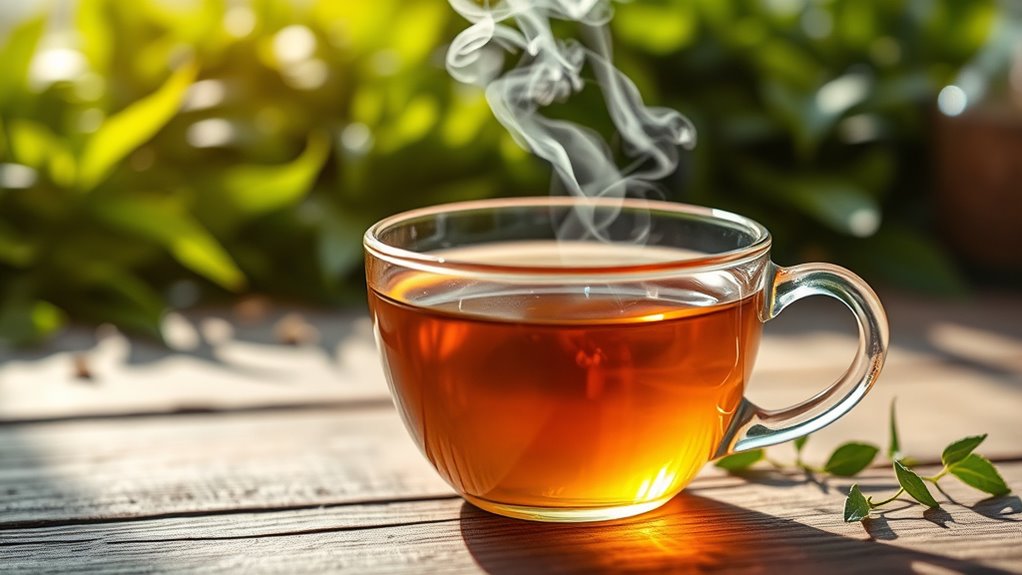Tea polyphenols can help reduce allergy symptoms by lowering inflammation and supporting your immune system. They’re powerful antioxidants that fight oxidative stress, a common factor in allergies. Drinking green or black tea regularly may strengthen your resistance and ease symptoms like sneezing and congestion. While tea isn’t a cure, it’s a helpful natural aid when combined with other treatments. Keep exploring to discover how different teas and their unique benefits could improve your allergy management.
Key Takeaways
- Tea polyphenols have antioxidant properties that reduce oxidative stress linked to allergy inflammation.
- They modulate immune responses, helping to prevent overreactions causing allergy symptoms.
- Regular consumption of tea may strengthen immune resilience against allergens.
- Both green and black teas contain polyphenols that can support allergy symptom relief.
- Tea polyphenols are a complementary approach, alongside medical treatment and trigger avoidance.

Have you ever wondered if your daily cup of tea could help manage allergy symptoms? It’s a common question, especially if you’re searching for natural ways to ease sneezing, congestion, or itchy eyes. The answer lies partly in the powerful compounds found in tea—specifically, tea polyphenols. These natural plant chemicals are known for their health benefits, and recent studies highlight their potential to influence allergy responses through immune modulation and antioxidant properties.
When you drink tea, especially varieties like green or black tea, you’re consuming a rich source of polyphenols. These compounds help regulate your immune system, which is often overactive in allergy sufferers. Instead of allowing your immune system to overreact to harmless substances like pollen or pet dander, tea polyphenols can help balance this response. They do this by modulating immune cells, reducing the release of inflammatory chemicals, and calming down the allergic reaction. Think of it as giving your immune system a gentle nudge in the right direction, helping it differentiate between harmful invaders and benign substances.
Tea polyphenols help balance your immune system, reducing allergy overreactions naturally.
In addition to immune modulation, tea polyphenols possess strong antioxidant properties. Allergies often involve oxidative stress, where an overproduction of free radicals damages cells and worsens inflammation. The antioxidants in tea help neutralize these harmful molecules, lowering overall inflammation and alleviating allergy symptoms. By reducing oxidative stress, tea polyphenols support your body’s natural defenses and may prevent some of the tissue damage associated with allergic reactions. This dual action—balancing your immune response and fighting oxidative stress—makes tea an appealing natural remedy. Furthermore, consuming tea regularly can contribute to skin health, which is often affected during allergy flare-ups.
It’s worth noting that the specific types of tea matter. Green tea, with its high concentration of catechins, is particularly noted for its antioxidant strength. Black tea, while slightly different in composition, still offers valuable polyphenols that can contribute to immune modulation. Regular consumption might build up your body’s resilience over time, potentially easing allergy symptoms or reducing their severity. However, it’s important to remember that tea isn’t a cure-all. It’s best used as part of an overall allergy management plan, including avoiding triggers and consulting healthcare professionals.
Frequently Asked Questions
Are Tea Polyphenols Safe for Children With Allergies?
You might wonder if tea polyphenols are safe for children with allergies. While they’re generally considered safe for pediatric use, it’s essential to follow proper dosage guidelines and consult a healthcare professional. Pediatric safety varies, so avoid giving high doses without medical advice. Always check for potential allergic reactions, and prioritize expert guidance to guarantee safe consumption for children with allergies.
How Much Tea Polyphenol Intake Is Needed for Allergy Relief?
Imagine opening a secret trigger for allergy relief! The recommended dosage of tea polyphenols varies, but generally, an ideal intake is around 250-500 mg daily. You should consult a healthcare professional for personalized advice, especially if you’re sensitive or on medication. Consuming this amount through tea or supplements may help soothe allergy symptoms, but moderation and consistency are key to achieving the best results.
Can Tea Polyphenols Interact With Allergy Medications?
You should be aware that tea polyphenols may interact with allergy medications, leading to potential drug interactions. It’s important to take into account dosage considerations, as high intake might influence how your medications work or cause side effects. Before adding tea polyphenols to your routine, consult your healthcare provider to ensure safe use and avoid any adverse interactions with your allergy treatments.
Do Different Types of Tea Have Varying Effects on Allergies?
Think of tea variety as different paintbrushes, each offering unique strokes. Your choice affects polyphenol content, which varies across green, black, and herbal teas. Higher polyphenol levels may help reduce allergy symptoms by acting as natural antihistamines. So, by selecting teas rich in polyphenols, you could potentially ease allergy discomfort. Experiment with different types to find which works best for your allergy relief, and enjoy the benefits of nature’s own remedy.
Are There Any Side Effects of Consuming High Doses of Tea Polyphenols?
You should be aware that consuming high doses of tea polyphenols might lead to potential toxicity and digestive issues. While moderate intake offers health benefits, excessive consumption can cause stomach upset, nausea, or diarrhea. It’s best to enjoy tea polyphenols in moderation and consult with a healthcare professional if you experience adverse effects. Monitoring your intake helps you avoid these side effects and supports your overall health.
Conclusion
Imagine a gentle breeze carrying away the haze of allergy symptoms, leaving your senses clear and refreshed. Tea polyphenols act like this soothing wind, soothing inflammation and calming your immune response. With each sip, you’re not just drinking tea; you’re inviting nature’s shield to surround you, reducing allergy discomfort. So, next time allergies threaten to cloud your day, reach for that warm cup—let tea polyphenols be your calming, natural remedy.










